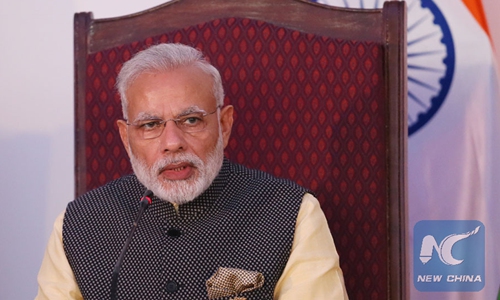HOME >> BUSINESS
Exorbitant demands may cost India last chance to join global value chain
By Wang Jiamei Source:Global Times Published: 2019/11/25 21:46:42

Indian Prime Minister Narendra Modi Photo: Xinhua
It now seems that India's decision to delay signing of the Regional Comprehensive Economic Partnership (RCEP) is nothing but another negotiating ploy.Considering imports from China, India will seek emergency import restrictions on more than 200 varieties of products, Kyodo News reported on Friday, citing an anonymous source close to the RCEP talks. India will also seek to impose higher tariffs on imports from China than from other negotiating countries, a stance that is strongly opposed by China, according to the report.
To a certain extent, India's concern over a widened trade deficit is justified as cheap Chinese products may probably flood into the country once the RCEP deal takes effect. Yet, the benefits of joining the RCEP are also obvious, especially at a time when its economy is showing signs of slowdown.
Over recent decades, a failure to participate in the global value chain was one of the reasons behind India's lopsided industrialization. Up to today, the country has engaged in no regional trade agreement. The RCEP is one of the few paths for India to integrate into the global value chain, which is currently mainly centered on Asia. It is now up to India whether to seize the opportunity or miss it.
It is true that without India's participation, the 15-member RCEP will shrink considerably in terms of population and trade volume. However, that doesn't mean India can change the deal without limits or ask for an exorbitant price. RCEP-participating countries may make certain concessions, but they will not always give in.
While the door remains open for continued negotiations with India, a missed opportunity can never be reversed.
The RCEP cannot wait for India forever. The current 15 member states of the RCEP will carry on and sign an agreement by 2020 as scheduled. Without India, the RCEP will cover a combined GDP of about $29 trillion, still the world's largest regional trade agreement. In the era when global trade is being roiled by unilateralism, such a multilateral trade system is particularly needed for regional economies.
The author is a reporter with the Global Times. bizopinion@globaltimes.com.cn
Posted in: EXPERT ASSESSMENT